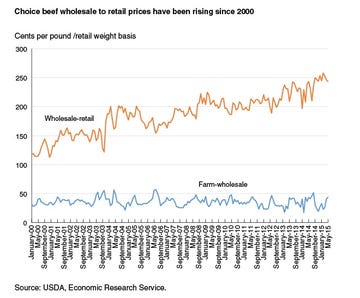Is TPP more about control than trade?

The Trans-Pacific Partnership (TPP) has been pushed for months now by many agricultural groups as a great boon to all ag industries. But after months of study I have concluded it is far more damaging than beneficial.
First, it's my estimation the actual gains appear small and slow to come. An example is in this USDA publication which specifically mentions trade with Japan. It says Japan will eliminate duties on 74% of its beef and beef product imports within 16 years, with substantial cuts to the remaining tariffs.
Note the length of the timetable, however. Most of the Japanese tariffs are to be reduced significantly or eliminated within 13-16 years. If we think of this as an investment such as we would make on the farm or ranch, is that a good one? How many business investments do you make that don't pay off for 16 years? Even most cows supposedly pay off by the sixth year.
More importantly, Japan has the right under TPP to maintain restrictive import quotas on at least 33 classifications of agricultural goods, so this is no true clearing of the deck.
I wonder what the Japanese agreements might net for U.S. beef producers, considering Japan was recently listed as the largest importer of US beef products at $1.6 billion.
In August just gone by, USDA said farmers (everyone below the packer) were getting 42% of the retail beef value and that percentage is dropping steadily. In addition, the wholesale-to-retail spread has been increasing steadily from about $1.20 per pound in 2000 to $2.50 per pound in 2015, and the farm-to-wholesale spread has been and continues a flat trend, varying from 25-50 cents.
 So if we assume for a moment that TPP supporters and the USDA are using retail values for beef, then that 42% of retail price would be $672 million total value for farmers. If we increased our take by an average of perhaps 15%, assuming that might be a reasonable improvement in our pricing after tariffs were gone or fully reduced, then we might see an additional $100 million here at home, distributed in typical crocodile-feeding-frenzy fashion among the three sectors of the beef industry. With USDA's count of 915,000 beef farms, that's about a dollar per operation, or with 30 million cows, that's about $3.30 per cow.
So if we assume for a moment that TPP supporters and the USDA are using retail values for beef, then that 42% of retail price would be $672 million total value for farmers. If we increased our take by an average of perhaps 15%, assuming that might be a reasonable improvement in our pricing after tariffs were gone or fully reduced, then we might see an additional $100 million here at home, distributed in typical crocodile-feeding-frenzy fashion among the three sectors of the beef industry. With USDA's count of 915,000 beef farms, that's about a dollar per operation, or with 30 million cows, that's about $3.30 per cow.
But I expect that is wishful thinking, as the top dogs usually eat more and let only the smallest scraps filter down the food chain; remember the shrinking farm-to-retail and farm-to-wholesale spreads.
Worse however, are these facts: TPP robs the ability of nations, including the United States, to make their own deals, and it puts their fates in the hands of international tribunals, and that it gives immense power to corporations to control the trade decisions of nations through lawsuits and other means.
First and foremost, TPP is an attack on our sovereignty. This means U.S. citizens are the only people in the world who were truly put in charge of our own affairs. Sadly, we have squandered our rights and frittered away our power, handing it over to the elected and bureaucratic megalomaniacs who we foolishly call "leaders," and to the big money that buys them. All these people are in cahoots to give themselves the ultimate power and control. It's Ayn Rand's Atlas Shrugged in real life.
An excellent article in The American Thinker last fall noted the 5,544-page TPP document contains seven things which have little to do with trade and everything to do with world government and cronyism:
A legislative body superior to Congress
A vehicle to pass Obama’s climate-change treaty
Increased legal immigration
Reduced patent protection for U.S. pharmaceuticals
Quotas on U.S. agricultural exports
Increased currency manipulation
Reduced U.S. power and self rule
An example is in Chapter 10, which calls for the opening of U.S. borders to foreign service companies that want to bring foreign workers with them to provide services in the U.S. Chapter 12 calls for the opening of U.S. borders to any foreign professionals they bring in. Chapter 12, "Temporary entry for business persons," provides that visas must be supplied to the professionals being brought into the country by these service companies and that they must be allowed to bring their spouse and children with them.
But under the appendices to Chapter 12, almost all of the other countries participating in the TPP limit immigration to certain professions and limit the length of stay of these "temporary" workers. For example, Japan limits entry to businessmen, specific professions and to technicians who have the equivalent of a Japanese associate's degree. It also limits the amount of time that they can stay in the country to five years. No such appendix appears for the United States.
Wikileaks founder Julian Assange said just days ago only five of 30 chapters deal with trade, and an examination of the table of contents and chapter summaries shows this is a fair assessment. The rest of TPP regulates an unimaginable number things, including the internet.
Paul Craig Roberts, an economist, journalist and former assistant secretary of the treasury for economic policy for President Reagan says one of the primary functions of TPP is to set global corporations above the laws of the nations where they operate.
William F. Jasper in The New American said much the same: "The real agenda behind the TPP is to consolidate and centralize economic and political power. The main organizing entity behind the TPP agenda is the secretive Trilateral Commission ... intended to be the vehicle for multinational consolidation of the commercial and banking interests by seizing control of the political government of the United States."
If you want to read more about TPP, remember everyone you read is biased and you'll have to filter through all that and try to discern the truth. Notice, too, that I put a link to the actual TPP document at the beginning of this blog, should you want to read through more than 5,500 pages.
Come to think of it, that should be reason enough reject the agreement.
The article in The American Thinker I quoted earlier says, "The only truly redeeming option of the TPP is that we can easily get out of it ... any country can withdraw from the agreement, simply by giving six months notice."
But I have a better idea. Let's demand Congress throw the damned thing in the incinerator where it belongs. Then we can work on real trade deals instead of setting up international governments.
More TPP links you might want to read:
http://www.tppcoalition.org/about/
(This list is corporate entities given early access to TPP)
http://www.flushthetpp.org/tpp-corporate-insiders/
http://www.aflcio.org/Issues/Trade/Trans-Pacific-Partnership-Free-Trade-Agreement-TPP
Political donations to US congressional members:
https://www.theguardian.com/business/2015/may/27/corporations-paid-us-senators-fast-track-tpp
You might also like:
Do small cows make more money?
How to get more value from your cull cows
About the Author(s)
You May Also Like


.png?width=300&auto=webp&quality=80&disable=upscale)
